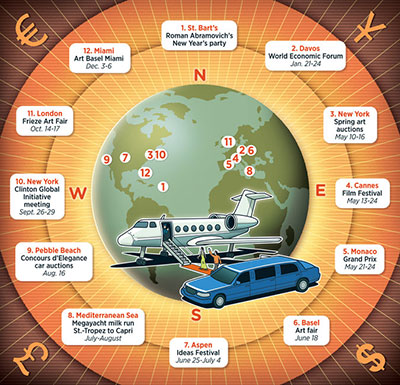Edge in the News: 2015

With This Idea Must Die (2015) barely off the presses, Brockman, editor of the online science salon Edge.org, asked the world's intellectuals for another opinion. They deliver in the latest of the editor's thick compendiums.
Occasionally turgid academic prose rarely mars the nearly 200 lively essays (few of which go beyond five pages) on the future of artificial intelligence. Every contributor—scholars, philosophers, artists, scientists, and journalists, including stars such as Freeman Dyson, Stephen Pinker, Brian Eno, and Daniel Dennett—knows that humans can already make a thinking machine in less than a year. Since the process obeys the laws of nature, a thinking computer is possible and, therefore, inevitable. ...
A satisfying experience for readers looking for thoughtful answers to big questions.

We used to think that the sun revolved around the earth and that the earth was flat. These ideas have been thrown into the trash. But who throws outdated ideas like IQ, free will and essentialism in the bin?
Scientific Weed (***)
The book "Scientific Weed" collects 179 Edge.org persistent ideas that block progress. A book full of interesting observations from top scientists about their field. ...

Jean Pigozzi, the venture capitalist and art collector, was lounging by the pool at his villa in Cap d’Antibes early this month, enjoying a rare break from what he calls “the circuit.”
After attending the World Economic Forum in Davos in January, he flew to the TED ideas conference in Vancouver, mingling with the likes of Yuri Milner, the tech investor, and Larry Page of Google at the “billionaires’ dinner.” Next came the art auctions in New York and the Cannes Film Festival, where he threw a pool party attended by Woody Allen, Uma Thurman and the billionaire Paul Allen. ...
The new rich have developed their own annual migration pattern. While the wealthy of the past traveled mainly for leisure and climate — the ocean breezes of New England in the summer and the sunny golf greens of Palm Beach in winter — today’s rich crisscross the globe almost monthly in search of access, entertainment and intellectual status. Traveling in flocks of private G5 and Citation jets, they have created a new social calendar of economic conferences, entertainment events, exclusive parties and art auctions. And in the separate nation of the rich, citizens no longer speak in terms of countries. They simply say, “We’ll see you at Art Basel.” ...
In fact, so many rich people have been joining the circuit that Mr. Pigozzi said a new “supercircuit” is emerging, one that has V.I.P. events within the V.I.P. events. At the TED conference, the aptly named “billionaires’ dinner” held nearby has become the most sought-after ticket."
Edge
Translation: Veronica Puertollano
Machines can imitate perfectly some of the ways humans think all of the time, and can consistently outperform humans on certain thinking tasks all of the time, but computing machines, as usually envisioned, will not get right human thinking all of the time because they actually process information in ways opposite to humans in domains commonly associated with human creativity. ...

Dawkins is mostly unconcerned by the possible damage he has inflicted on his reputation, but he has moments of self-doubt. “I genuinely don’t know whether I’m going about it the right way,” he said, in the half-resigned tone of someone who probably couldn’t go about it any other way. Recently, there have been some signs of reputational management – in a video interview on his “Vision of Life” for the Edge website [https://edge.org/conversation/richard_dawkins-this-is-my-vision-of-life], he discussed Darwinian natural selection without once mentioning his anti-religious campaigning. His memoirs, he pointed out, bypassed his various online wrangles entirely. In conversation, Dawkins seemed concerned that an article about him would draw disproportionately on his Twitter feed – in his eyes, an insignificant late chapter in the context of his whole career. “I’m a scientist,” he said, as if this fact might be forgotten. ...
Perhaps a culture needs someone like Dawkins: his unswerving commitment to a cause, his enormous capacity to inflame and offend. Daniel Dennett, a keen sailor, described Dawkins as his “sacrificial anode” – the hunk of zinc you bolt to the propeller shaft on a boat to protect the propeller from being eroded by seawater. The zinc is gradually worn away while the propeller remains unscathed. “In life you always want somebody out to the left of you to take the heat.”

A response to the 2015 Edge question.
It seems increasingly likely that we will one day build machines that possess superhuman intelligence. We need only continue to produce better computers—which we will, unless we destroy ourselves or meet our end some other way. We already know that it is possible for mere matter to acquire “general intelligence”—the ability to learn new concepts and employ them in unfamiliar contexts—because the 1,200 cc of salty porridge inside our heads has managed it. There is no reason to believe that a suitably advanced digital computer couldn’t do the same. ...

Over at Edge, John Brockman features British historian David Christian on the need to come up with a new origin story that can serve the global community.
Christian, the author of This Fleeting World: A Short History of Humanity, started his career as a professor of Russian history, and over the years as he refined his lectures on the Cold War, he realized…
…I was giving the subliminal message that humans are divided, at a fundamental level, into competing tribes. Having lived through the Cuban Missile Crisis, I remember it vividly. I was a schoolboy in England where this tribalism threatened to blow us all up. That was a very vivid experience for me. I thought, for historians to keep teaching this subliminal message—that we’re divided by tribes—is not a good thing.
So Christian began a program to teach ‘big history’–the story of the whole world, from the Big Bang up to the present day. The goal: to help transcend the tribalisms perpetuated by narrower ethnic and religious histories. ...

We all know that computers can sometimes automate work, taking jobs away from humans. But it can augment human workers as well, making them more effective. In our ongoing research, we’ve found that so far augmentation is far more common, even in the emerging area of “cognitive computing,” in which machines can sense, comprehend, and even act on their own. In this sense, cognitive computing is more about “Person and Machine” than “Person versus Machine.”
But our view grows out of our observations of organizational applications available today. What about in the future?
For well-informed prognostication, it’s helpful to turn to the brain trust at Edge.org. Each year, Edge.org publishes essays from thinkers, scholars, and researchers on a question related to a hot topic in public and academic discourse. This year’s question was, “What do you think about machines that think?” It prompted 186 respondents to write more than 130,000 words total.
While the essays looked at a range of issues, a number of respondents touched on advances in how thinking machines could augment human intelligence. They discussed carefully-considered forms of human-machine interaction, many of which have implications to various businesses and industries including management, health, and creative fields. These answers help us to imagine what the future of computer-augmented work will look like, and what the challenges are to getting there. ...

You've read The News Journal, but have you ever been curious as to what people who put out The News Journal read?
Staffers weigh in with their latest reads
Matt Albright, Education Reporter
What I'm reading: "This Idea Must Die," by John Brockman
Why you should read it: What if you could get some of the world's leading scientists and philosophers in a room and ask them what scientific idea is most inhibiting progress for humanity? This is basically that in book form. I'll admit some of the more highly-technical scientific answers have flown over my head, but this book is really making me think.

Alien Attack
Seriously. Writing in the recently published book What Should We Be Worried About?, senior astronomer Dr Seth Shostak admits this "sounds like shabby science fiction, but even if the probability of disaster is low, the stakes are high." ...

The great discovery that launched the scientific revolution was the insight that humans do not know the answers to their most important questions. It was the discovery of ignorance.
These musings take me back to Edge (www.edge.org), a website founded by John Brockman, a literary agent specializing in serious nonfiction (mostly scientific). Among other endeavors, Edge every year asks a single question of 150-200 leading scientists and researchers. The 2014 question, which particularly titillated me, is best summarized by the title of its published collection of answers (Harper Perennial, 2015):
This Idea Must Die: Scientific Theories That Are Blocking Progress
I find it exhilarating to have so much of our scientific elite capable of questioning the generally accepted wisdom that they have helped create or sustain. To me, this is a typically American phenomenon.
Some years ago, two different Chinese journalists interviewed me and asked the same question, which was very popular at the time: “Do you think China can innovate?” I responded, “If you ask whether Chinese people are capable of innovating, the answer is that we have hundreds or maybe thousands of them innovating every day in Silicon Valley. But to innovate you need a degree of chaos, so the real question is, How much chaos is China willing to accept?”

The world continues its path as technology advances and some futurists have been making bets that seem incredible about what we will achieve in the not too distant future.
Futurist Ray Kurzweil, for example, believes that by 2040 artificial intelligence will be so good that the humans will be completely immersed in the virtual reality that, when technology becomes advanced enough to change the human race irreversibly something will happen called Singularity.
Kevin Kelly, who helped launch Wired in 1993, believes the next 20 years in the field of technology will be radical.Therefore, according to him, technological advances will make the past 20 years "pale" in comparison.
Kelly points out that if you send to the past with a time machine, even if they were only 20 years, and we counted the people we have now and what we'd have time on mobile devices: a free encyclopedia and street maps of most cities in the world, pictures of real-time scores and stock quotes, weather reports, PDF files of all books in the world, etc .; simply call us crazy.
"There is a feeling that everything important has already happened, but relatively speaking, nothing important has happened yet. In 20 years we'll look back and say that not much has happened in the last 20 years. "
How will these amazing changes? Kelly said some of his predictions in an interview with John Brockman on Edge. They are very simple and not so futuristic predictions as they are already quite predictable: robots, big monitoring data ... and something interesting, a human they would then ask intelligent questions. ...

READ: "This Idea Must Die: Scientific Theories that Are Blocking Progress," ed. John Brockman
"This Idea Must Die" is a fascinating collection of mini-essays from 175 scientific luminaries describing which scientific idea they deem most eligible for falling by the wayside, cushy grants and prevailing vogues be damned. The strength of the essays lies both in their disciplined brevity as well as the remarkable ability of these very brilliant thought-leaders to convey their areas of inquiry in a manner general readers can understand. For those who tend to stereotype the planet's empiricists as plodding, observation-driven technicians, the elasticity of thought and imaginative excursions on display here easily dispel that notion. Surely recognizing and articulating the sacred cows in our midst, as happens here, is one step towards constructing newer, better models.

If New Good Science can’t be trusted to hack away the detritus of Bad Old Science, perhaps we need to exit fully-appointed laboratories altogether for unfunded but informed speculation. That’s where Editor John Brockman’s This Idea Must Die fits the bill nicely.
This Idea Must Die is a fascinating collection of mini-essays from 175 scientific luminaries describing which scientific idea they deem most eligible for falling by the wayside, cushy grants and prevailing vogues be damned. In that sense this book puts speculative self-correction back in the driver’s seat. Think of a Pruner’s Digest that argues for clearing away old brush to make room for the green shoots of tomorrow. ...
This review barely scrapes the surface of what lies in store for the intrepid reader. The strength of the essays lies both in their disciplined brevity as well as the remarkable ability of these very brilliant thought-leaders to convey their areas of inquiry in a manner general readers can understand. ...

...Our innovative journey toward change involves inquiry, curiosity and doubt. Much of this we do the same way the Wright’s did – by letting the world know of our thoughts and views. Any proponent of change has to proclaim his/her thoughts. Galileo, one of the greatest astronomers and scientists of all time, defended his views on heliocentrism in Dialogue Concerning the Two Chief World Systems. Philosophers such as Plato, Kant and Nietzsche, and many others, published their thoughts that changed the world in outlook and philosophy. A new innovative book This Idea Must Die edited by John Brockman takes us through scientific theories and practices that are blocking our progress. At a recent interview, Brockman said: "Daniel Kahneman has studied human rationality and found out that characteristics we thought we had as humans aren’t necessarily the case. We are not HOMO ECONOMICUS, we’re not the rational human beings we thought we were. A lot of what we do is pre-conscious and without acknowledgement."...

Are there scientific ideas that have become too old and are actually blocking progress instead of enabling it? According to John Brockman - publisher of the world's smartest website Edge.org - there are. So he challenged the greatest scientists, artists and philosophers to answer the question: "What scientific idea needs to be retired in order to make room for new ideas to advance?" The answers he put into a book of 175 essays that he called "This Idea must die". Lawrence Pollard has been speaking to John Brockman.
It all started with a young scientist named Laurie Santos at a conference that I ran saying, “How do we get rid of some of these ideas that are just standing in front of us? Just blocking everybody?” A lot of these ideas have to do with being promulgated by elderly, white males still alive whose names are attached to them. It comes down to is science advertising or is it argument?

On his website Edge.org, John Brockman—an idea guru—interviews and opens dialogues with the century’s brightest minds (many of which he represents as their agent). Every year, he publishes a book that poses an unsettling question to philosophers, scientists, and other kinds of big thinkers. This is how he’s come up with his 'question books,' such as WHAT SHOULD WE BE WORRIED ABOUT?, WHAT HAVE YOU CHANGED YOUR MIND ABOUT?, WHAT IS YOUR FAVORITE DEEP, ELEGANT, OR BEAUTIFUL EXPLANATION?, and WHAT IS YOUR DANGEROUS IDEA? Reading through the answers (both on the website and in these annual question books) would be an excellent way for extraterrestrials to figure out what’s going on in the minds of those crazy humans.

Few will dispute the fact that this world we live in is built on ideas. They encompass anything between the ideals of democracy to the relatively more recent technological conveniences such as the Internet. ...
Some of these have been discussed in a new book titled, "This Idea Must Die: Scientific Theories That Are Blocking Progress." This is the latest in a series of annual books posing a question every year to some of the best minds.
The brainchild of John Brockman, the founder of the intellectually stimulating edge.org, the current book is a compendium of answers to the question, "What scientific idea is ready for retirement?" posed to 175 of the world's greatest scientists, philosophers, and writers.
As Brockman explains it, few truly new ideas are developed without abandoning old ones first. And, as theoretical physicist Max Planck (1858-1947) noted, "A new scientific truth does not triumph by convincing its opponents and making them see the light, but rather because its opponents eventually die, and a new generation grows up that is familiar with it." ...

Architecture and design give order and meaning to the spaces, changing the conception and, often, flipping it to its foundations.An idea of breaking it actually constitutes a solid basis for innovation. With the same momentum design school Domus Academy, founded the Metaphysical Club: a gathering of 15 thinkers with a multidisciplinary approach rigorously that has the task of indicating the guidelines to form the designers of tomorrow. ...
Founded at the request of the creative director Gianluigi Ricuperati, with the collaboration of Francesca Vargas, leader of the Master course in Interior Design & Living, the Club will meet several times a year to Milan to identify the themes that will guide the search and location of Domus Academy in the following months. The approach is inspired by the vibrant atmosphere of literary cafes and salon intellectuals of every time and place, and not the physical: the Parisian circles of late nineteenth century to the platform Edge.org [http://edge.org], the virtual space where scientists and scholars discuss openly of topics and themes disparate. Because every point of view is different from the other and why diversity should become the largest resource for teaching, rather than a limit.
by Sam Roberts, New York Times Obituary
Barbara Strauch, a reporter and editor who wrote two books about the brain and directed health and science coverage for The New York Times for a decade, died on Wednesday at her home in Rye, N.Y. She was 63. ...
“Something quite serious has been lost,” she wrote in 2013 on the website Edge.org, an online discussion group. “And, of course, this has ramifications not only for the general level of scientific understanding, but for funding decisions in Washington — and even access to medical care. And it’s not good for those of us at The Times, either. Competition makes us all better.




